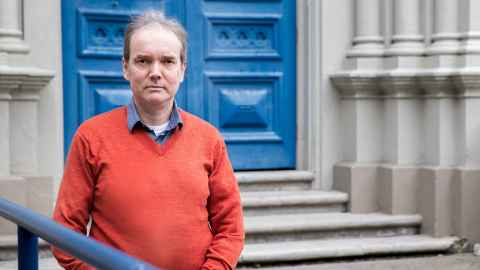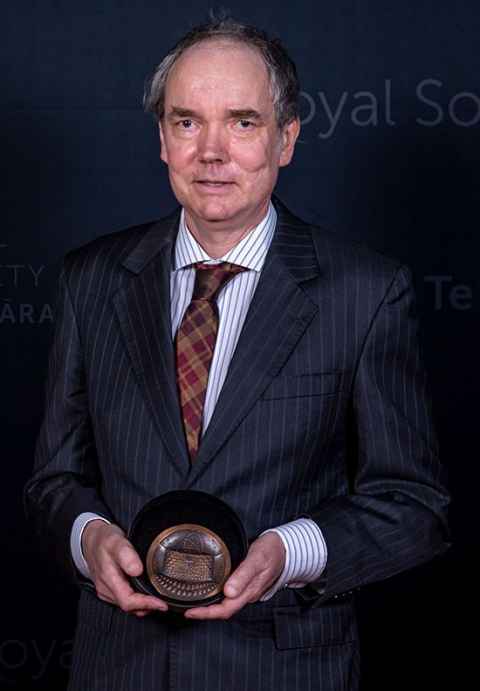Life, the universe and everything
13 December 2022
What do we owe people in the future, what's the purpose of the universe and what are the connections between the two? These huge, perennial questions are the focus of Professor Tim Mulgan’s distinguished and extensive research.

A professor of philosophy in the Faculty of Arts at the University of Auckland, Dr Mulgan is the 2022 recipient of the Humanities Aronui Medal from the Royal Society Te Apārangi.
He says thinking about how we can extend current ethical thinking, which focuses on what we owe to one another, to cover the many new ways in which we can influence the lives of future people involves “fascinating philosophical puzzles” driven by the fact that the very existence and identity of future people depend on our present decisions.
“Can you harm someone by your actions if they would otherwise never have existed at all, for example? And there is also the pressing, practical question of how we should balance the interests of people in the present against the interests of those in the future.”
His research on cosmic purpose arose indirectly from a teaching experience at the University of Auckland.
“In 2003 I was teaching a course on the existence of God in our first-year metaphysics course (PHIL 100). We worked our way through a series of arguments for and against the existence of God that have been central to Western philosophy for much of the last 2000 years.
“Looking at these arguments in quick succession, I was struck by the thought that, even if they succeed, most traditional theist arguments only enable us to conclude that there is a God of some kind, while these same arguments would also only prove there is not a God who cares about us.
“This leaves open a third alternative: that there is a God (or other source of cosmic purpose), but that we are irrelevant to that purpose. This thought eventually led to my 2015 book Purpose in the Universe.”

He says the connection between the two projects is that a particular challenge in the field of future ethics is motivation.
“How can we motivate present people to make the sacrifices that we owe to future people? My tentative answer is that we need the human future to link our own lives in meaningful ways to the purpose of the universe.”
One strand of his research imagines possible futures – damaged by climate change or facing imminent extinction – and asks how philosophers living in those futures might respond to our current philosophy and behaviour.
“The purpose of these thought experiments is to see our present values and priorities from the outside.”
All his research is informed by teaching, he says.
“Like many academic disciplines, philosophy can easily descend into technicalities and jargon that lose touch with reality. It’s very good to have to explain to a room (or Zoom) full of young people why these abstract theories and thinkers matter.”
The Humanities Aronui medal is awarded annually for “for research or innovative work of outstanding merit” in the field and in a pleasing connection, Professor Mulgan says previous recipients have included two of his teachers at the University of Otago (Professors Alan Musgrave and Jim Flynn) and three colleagues from the Faculty of Arts: Distinguished Professor Brian Boyd, Professor Selina Tusitala Marsh and last year’s recipient, Professor Annie Goldson.
How can we motivate present people to make the sacrifices that we owe to future people? My tentative answer is that we need the human future to link our own lives in meaningful ways to the purpose of the universe.
His medal’s citation refers to his “prolific, original, and influential contributions to moral philosophy, philosophy of religion, and political philosophy” which “exemplify excellence in the humanities”.
“Unified by the search for a convincing philosophical account of future ethics, [Professor Mulgan’s] work has shaped current academic debates in philosophy and significantly influenced scholarship in other disciplines including theology, development studies, environmental studies, and political theory.”
Professor Mulgan has published six sole-authored monographs and 50 sole-authored chapters and articles with leading academic presses. In recognition of his exceptional scholarship, he is regularly invited to deliver plenary addresses at international conferences and contribute to prestigious edited collections.
He was appointed Professor of Moral and Political Philosophy at the University of St Andrews, a world-renowned philosophy department, in 2005 and still retains a part-time position there.
He has edited The Philosophical Quarterly, a leading philosophy journal, and won a Laurance Rockefeller Fellowship at the Princeton University Centre for Human Values.
He grew up in Dunedin, where his parents were both academics at the University of Otago. He studied philosophy at Otago and later went on to Oxford on a Commonwealth Scholarship, where he wrote a doctoral thesis on what affluent people owe to distant strangers.
He has taught at the Universities of Otago and St Andrews and is currently a professor in the School of Humanities at Auckland.